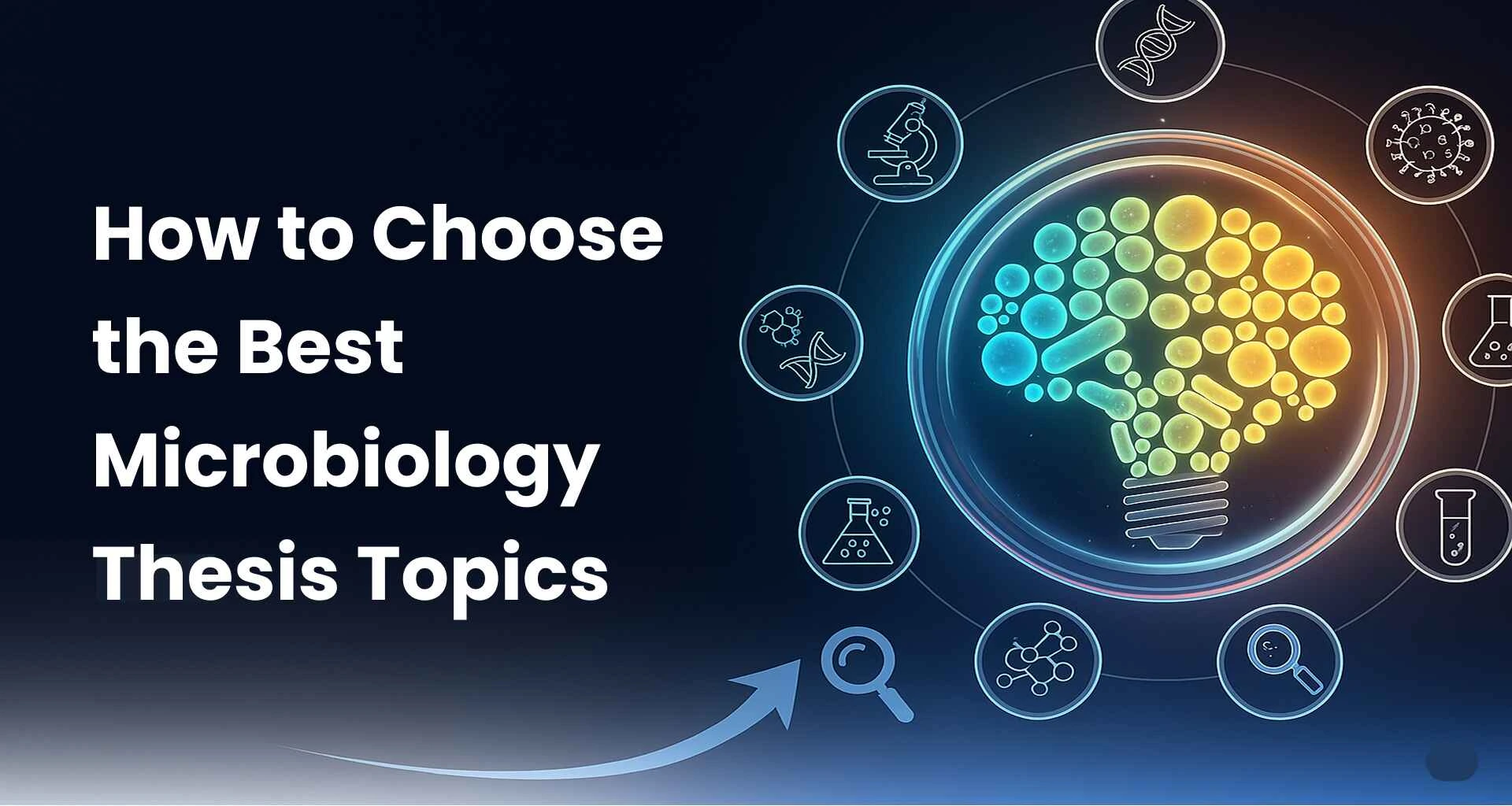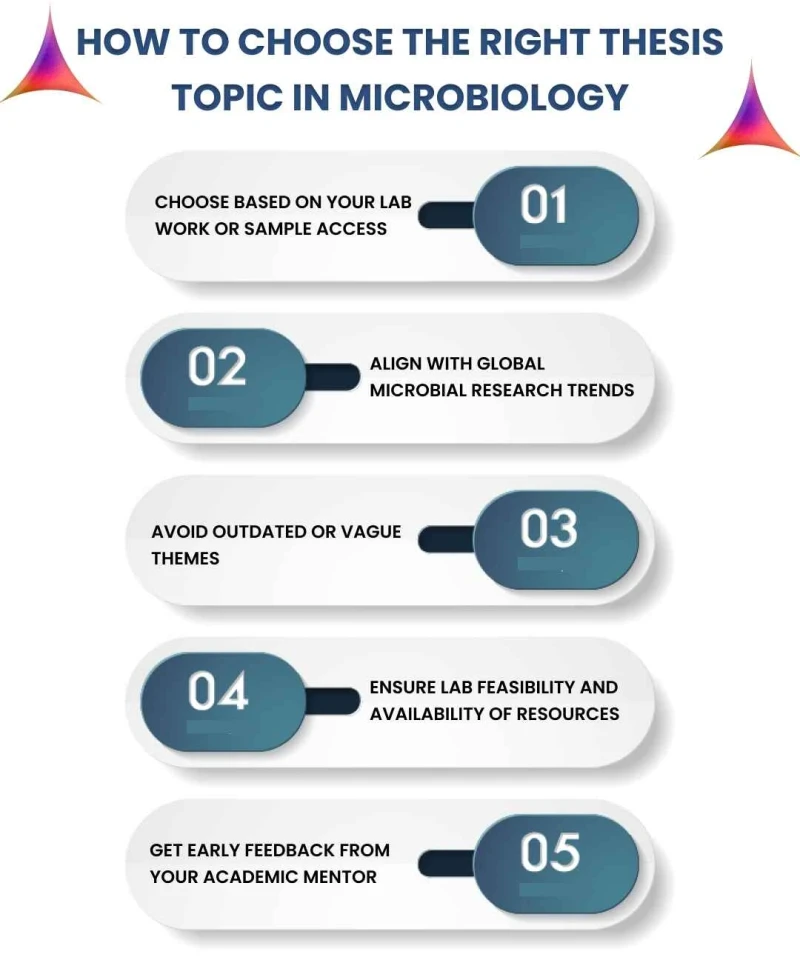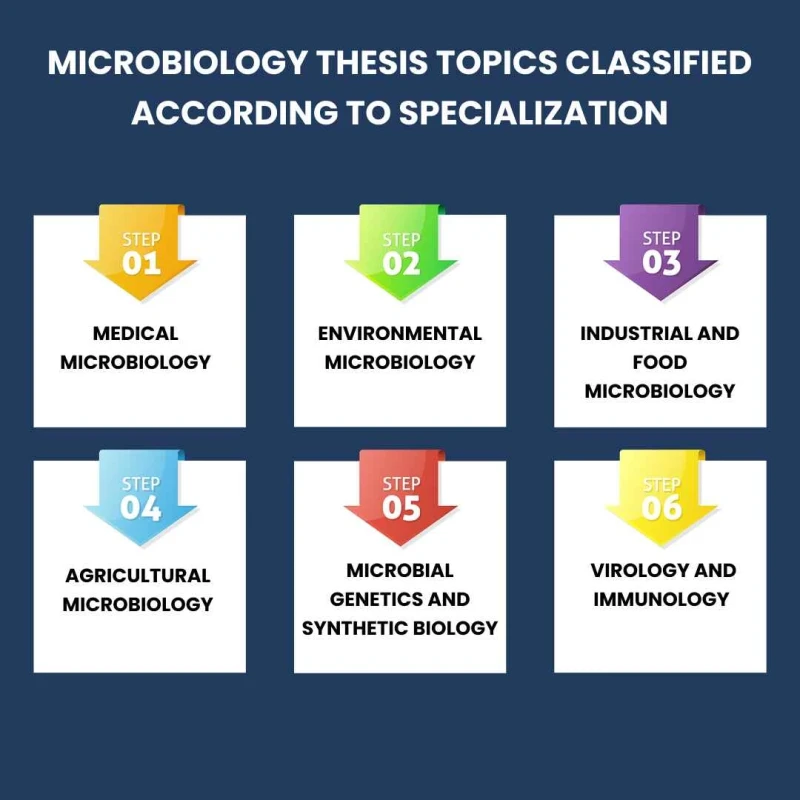Methods of Primary Data Collection in Research Methodology
Master the top methods of primary data collection in research methodology. Learn to use surveys, interviews, and experiments to gather original, high-quality data.

Santhi.GN
Microbiology, the scientific investigation of microscopic life like bacteria, viruses, fungi, and protozoa, is essential for the progress of medicine, agriculture, the environment, and industry. In a world facing challenges such as antibiotic resistance, emerging infectious diseases, global warming, and sustainable agriculture, microbiological research has never been more important.
Producing a thesis on this subject is a milestone moment for students—both intellectually and professionally—presenting an opportunity to be involved in practical solutions.
Still, choosing the appropriate microbiology thesis topics might be daunting. Students often find it challenging to locate topics that are innovative, practicable, and pertinent to current scientific requirements. An appropriate thesis topic does not just stimulate motivation but also increases research contribution and future career opportunities.
This blog aims to make it easier by offering a systematic guide on how to pick the ideal microbiology thesis topic, as well as a list of upcoming research ideas.
Your thesis topic is the cornerstone upon which rests the success of your research process as a whole. The appropriate topic determines the quality of laboratory experiments, the existence of trustworthy data, and the range of publishing the results in valid journals.
It also determines your success in meeting the demand for project completion within a stipulated time and impressing academic assessors.
Picking a bad or obsolete topic can result in severe setbacks, such as inability to access samples, insufficient literature, or ethical issues in performing experiments. Certain topics seem fascinating, but are not practically possible with the available resources and time you possess.
Therefore, it's essential to select the thesis topics of microbiology that reflect global microbiological priorities, emerging technologies, and your personal interests. A strategic and informed choice enhances your credibility as a researcher and opens doors to future academic or industrial opportunities.

To make an intelligent choice, use these important steps:
Your availability of cultures, reagents, and samples should dictate your topic.
Keep abreast of fresh advancements in antimicrobial resistance, synthetic biology, and climate-induced microbial changes.
Avoid generic subjects without a distinct hypothesis or applicability to current problems.
Assure that your department possesses the equipment and facilities required for your experimental setup.
Meet your mentor periodically in order to shape your topic and steer clear of bumps down the road.
A quality academic institution enhances the level of your thesis to a significant extent. Highly ranked universities provide access to upgraded molecular biology labs, microbial culture collections, and advanced analytical tools. They also employ strict ethics and facilitate cross-disciplinary collaboration.
Upon choosing an institute for your microbiology thesis research areas, keep the below points in view:
Access to biosafety-level laboratories and microbial repositories
Qualified teachers actively involved in ongoing research projects
Availability of research grants and co-operations with industries or hospitals
Ease of publication in indexed journals
Excellent mentorship and frequent workshops or thesis writing seminars
Institutes with excellent research output and a history of successful student theses give your project space to flourish.

To guide you through possible areas of research, here's a classified list of popular microbiology thesis topics in 2025.
Medical microbiology deals with pathogens and their diagnosis, treatment, and prevention. It is a fast-changing discipline with international health implications.
Investigation of antibiotic resistance genes in infections acquired in hospitals
Molecular diagnosis of multidrug-resistant strains of tuberculosis
Gut microbiota's role in autoimmune disease
Emerging fungal infections in immunocompromised hosts
Biofilm-forming capability of urinary tract pathogens
Use of CRISPR in bacterial genome modification
Nanotechnology-based rapid detection of sepsis biomarkers
Study of zoonotic transmission of coronaviruses
Comparative analysis of hospital vs community-acquired MRSA strains
This section studies microbial interaction with the environment and their function in ecosystem processes.
Microbial degradation of plastic waste in marine habitats
Extremophiles' role in climate-resilient ecosystems
Soil microbiome shift due to pesticide misuse
Microbial bioremediation of heavy metal-polluted water
Analysis of wastewater microbiota in urban versus rural environments
Metagenomic profiling of landfill microbiomes
Effect of ocean acidification on marine microbial life
Microbes' role in reducing greenhouse gases
Bioindicators for river pollution assessment
This field addresses microbes in industrial processes, particularly fermentation and food safety.
Isolation of probiotic strains from traditional fermented foods
Microbial spoilage mechanisms in ready-to-eat products
Bacteriophage application in the control of foodborne pathogens
Development of biosensors for the detection of dairy contamination
Genomic characterization of yeast strains employed in the brewing of alcohol
Antibiotic resistance among food chain bacteria
Biotechnological advances in enzyme production with microbes
Role of lactic acid bacteria in enhancing food shelf life
Employment of synthetic microbes in flavor improvement
This discipline delves into the utilization of microbes to enhance soil health, crop yield, and sustainable agriculture.
Rhizobacterial strains for enhancing fixation of nitrogen in legumes
Antifungal biocontrol agents for crop protection
Soil microbial diversity under organic versus chemical farming
Application of endophytic bacteria for drought resistance
Effect of GM crops on indigenous soil microorganisms
Microbial inoculants for sustainable agriculture
Function of microbes in phosphate solubilization
Molecular tools-based detection of plant pathogens
Biodegradation of agrochemicals by microbes
This stream entails gene manipulation and microbes engineering for new uses.
Engineering of E. coli for the production of biofuels
CRISPR-based microbial genome editing
Synthetic microbial consortia for environmental remediation
Directed evolution of industrially relevant microbes
Genome mining for new antibiotics
Regulation of gene expression in thermophilic bacteria
Microbial carbon fixation pathways
Plasmid transfer mechanisms in multidrug-resistant strains
Functional metagenomics for unculturable microbes
This discipline is concerned with viruses, host-pathogen interactions, and immune responses.
Host immune response to dengue virus infection
Molecular epidemiology of hepatitis B in high-risk individuals
Vaccine development through mRNA platforms
Viral genome evolution in response to vaccines
Role of interferons in antiviral defense
Zoonotic transmission potential of bat viruses
Cross-reactivity in flavivirus infections
Immunomodulation by gut viruses
Emerging viral threats and pandemic preparedness
Overlooking safety procedures or ethics clearances may result in proposal rejections, suspended research, and health hazards for you as well as your lab mates.
Selecting a topic without ensuring access to microbial strains, clinical samples, or good-quality datasets renders the research impossible and holds up your thesis progress considerably.
The selection of old or overworked ideas lowers innovation, minimizes potential for publication, and adds little to ongoing microbiological research and scientific growth.
Failure to frequently consult academic advisors may lead to defective methodology, poor goals, and the absence of scholarly assistance during crucial thesis stages.
Selecting a difficult research design beyond your lab facilities, funding level, or technical competency level can threaten your success in finishing the thesis.
Feeling overwhelmed by the sheer number of options? Relax, you're not the only one. The vast majority of students find it difficult to balance interest, feasibility, and relevance. This is where the skill comes into its own.
Our thesis experts can help you narrow down the best thesis topics in microbiology, conduct feasibility checks, and ensure ethical and academic compliance. Through their help, you reach higher clarity, confidence, and satisfaction that your topic is outstanding and fitting for your academic goal.
We offer topic ideas based on current worldwide microbiology trends and research hotspots emerging. Our professional mentors guide your microbiology thesis to be in alignment with university rules and ethical research practices.
We help obtain datasets, microbial cultures, and laboratory support to facilitate your research work.
We provide all-round assistance from research proposal development to final viva and publication assistance.
We provide full compliance with formatting and ensure timely delivery of your thesis according to institutional specifications.
Master the top methods of primary data collection in research methodology. Learn to use surveys, interviews, and experiments to gather original, high-quality data.
Don’t write your methodology without reading this. Learn why purposive sampling is essential for case studies and how to define your inclusion criteria. Url:purposive-sampling
Master the chapterization of thesis to ensure logical flow. Learn the standard academic framework for organizing research into a professional, approved document.
A practical guide to sentiment analysis research papers covering methodologies, datasets, evaluation metrics, research gaps, and publication strategies.
Master data analysis for research papers. Learn quantitative and qualitative methods, cleaning, and reporting standards to ensure your study meets journal rigour.
Want to impress your peers? Discover the best ways to condense your research, avoid common mistakes, and handle tough questions at any academic conference.